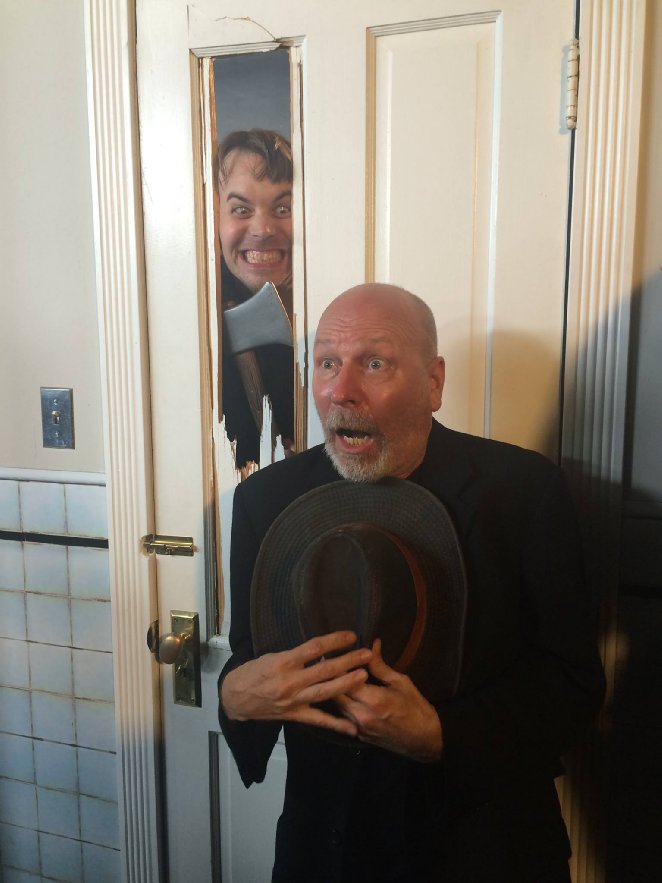
CrypticRock.com – You both have been involved in the Horror genre, between writing, editing and directing for many years now. Is it safe to say that creating Horror is a passion for you both?
John Skipp – Of course! It has been, pretty much, our entire lives in one way or another, and it remains fun to this day.
Andrew Kasch – Yeah, it has an absolute blast. At this point, It is like oxygen for us. (John laughs) You just have to keep going, making crazy, wild, fucked up shit that really gets an audience riled up. That is what we like to do. We like to entertain and get audiences really riled up. That is the best feeling in the world.
John Skipp – Horror is not necessarily the point, but it is one of the great secret ingredients that makes things lively, just playing with the darkness. Particularly, going into the darkness and finding crazy light inside it, to me, is one of the most fun things you can do with your life. Again, just making people’s jaws drop. There is no substitute.
- Colonel Jim Productions
- New Line Cinema
CrypticRock.com – Right, so more about the shock value?
John Skipp – Yes, and the weird joy in the shock value. In a lot of ways, it is not even just shock, it’s genuine surprise. The “I didn’t see that coming!” It is so easy to guess your way through most conventional narratives, so when somebody really throws you for a loop, we salute them. We want to be two of those “throw for a loop” mongers; be known as dudes who do that kind of shit.
Andrew Kasch – We are carrying on the carny tradition. (John laughs)
CrypticRock.com – (laughs) Now John, what do you find is the hardest thing to deal with when turning your own novels into scripts?
John Skipp – The hardest thing – in the beginning – was realizing that suddenly your story is not your story anymore. It is now your story conjoined with whatever corporate committee is now wanting to steer it. That was actually way harder than any logistics of adaptation. Of course, we had to learn how to write screenplays before we could do it well. There was definitely a learning curve because the difference between writing a novella and writing a screenplay is like the difference between writing a short story and writing a haiku. There is this massive stripping down that needs to happen in terms of interior monologue and all of the things that a book can do that a screenplay cannot. Plus, you have to be totally concerned with what you can show on the screen, and everything else has to go. It is really, by comparison, a very skeletal, haiku type of planning. Once you get past the formalities of it, the hardest thing was realizing that your ideas are not yours anymore, if you are going to play with those guys.
CrypticRock.com – Right, that has to be frightening because once they buy it, it is theirs.
John Skipp – Yes, for better or for worse. The good news is – if there is any good news – you make some money. The really good news is, if the movie is good, then good. If the movie is god-awful… like Animals (2008), which was a movie made based on one of my novels; something I had nothing to do with except for watching it in dumb horror as it unfolded on the screen and just going, “Oh, man! You fucked that thing into the dirt!” It was excruciating. I became a film director, largely, so that nobody would get to screw me like that again.
CrypticRock.com – That makes perfect sense. Now you have more creative control over what is going on?
John Skipp – It is the only way for a writer to have any control, whether it be as a writer/director or a writer/producer, or both. Once I realized that was the case, I started really studying film and what being a producer or director would involve. That was when I fell in love with the process itself, with the shooting, editing, pre-production, planning, and all of the other things. Now it’s not only about, “This is the only way to protect myself!” Now, it is the only fucking thing I want to do.
CrypticRock.com – Exactly. You have this vision in your head from when you wrote that story of how you want something to look and you want to be sure that the final product ends up how you initially imagined it.
John Skipp – Right! If you want to collaborate with people – and film is an entirely collaborative act – then you want to collaborate with people who totally get what you are doing and bring exciting things to the table so that it becomes more than that thing that was in your head. It becomes something greater and better, as opposed to something uglier, shittier, and worse. The advantages are clear.
CrypticRock .com – That definitely makes a lot of sense from the creative perspective. The next question is for Andrew, and it is along these same lines. You did a lot of editing in your career. Do you prefer editing over directing?
Andrew Kasch – No, but they are also two sides of the same coin really. If I were to direct anything, the thought of having someone else edit it really irks me because I feel like you are taking away a very vital piece of control over the movie. To me, you are really making all of the same sort of creative, directorial decisions. I even feel that way when I am working on TV. I am not just cutting dailies together, I’m molding the tone of the show, the feel of the show, the performances and the characters, and in some cases, I’m rewriting themes or adding new lines of dialogue that the actors have to record to make things clearer or punchier. To me, directing and editing are the two most vital parts of making a movie and having the most control over the process. To me, they are really not all that different.
The worst thing, in the TV world, is when you encounter a director who does not understand editing. That was what used to happen. There were a lot of old fashioned directors from the ’80s and ’90s, all they knew of directing was that they would throw up four or five cameras and shoot a scene with no real plan and then expect the editors to put it all together and make sense of it all. The best directors are the ones who have a plan and understand, in their head, how it’s all going to come together. The similarities are much closer than you would think.
CrypticRock.com – That is an excellent point. Without them being on the same page, the vision is lost. The Horror genre has seen its fair share of changes over time, and the recent influx of remakes, sequels and PG-13 rated Horror films. As Horror fans yourselves, is it important to you to bring audiences something fresh and not some watered down reboot?
John Skipp – Yes, my operating philosophy is that I only want to tell the kinds of stories that only I can tell. If somebody else can do it, then let them do it. I will go for the ones that are burning in me. I know a lot of creative people feel that way. The idea is to come up with things that other people will be remaking and sequelizing until the end of time, as opposed to just doing somebody else’s. Let somebody else do that.
Andrew Kasch – It is not the writers and directors, it’s the money men.
John Skipp – It’s the money.
Andrew Kasch – They follow the money trail and, as much as I hate to say this, the people that are making these movies happen are the ones that complain that there’s too many remakes or a lack of original ideas. They are the ones who are paying and voting with their wallets. If they are only going out to the theatre to watch the new Platinum Dunes movie – whatever horrible thing they have remade this time – then they are the problem! I hate to say that, but I think it is important for every filmmaker out there, especially in this genre, to do something original, unique, and bring the world something that has not been seen before. It is just a matter of getting the actual opportunity to do it.
Piracy is also a huge thing that has hurt the independent and original movies because those tend to make less money at the end of the day. They tend to be less profitable because of piracy. They get wide exposure, but they do not make any money. We have seen the middle class get eliminated. Nobody gets a million, ten million, or even twenty million dollars to make a monster movie anymore. They either get fifty thousand dollars or a hundred million dollars. There is no in between anymore.
John Skipp – Much like the rest of the middle class.
Andrew Kasch – Yes. It’s actually a very weird time to be a filmmaker right now. I love it because the technology has made it more accessible, but on the business side of things, it is a very strange time. I think we are all sort of waiting for that bubble to burst to where we can get back to doing crazy, out there movies with sensible budgets.
John Skipp – One of the things I like about what is happening right now is that it is forcing more small budget films to be innovative and find ways to try and pop themselves out. I honestly feel that almost all of the best Horror movies ever made were made on a low budget.
- Anchor Bay
- Image Entertainment
CrypticRock.com – That is very true and many would agree with what you are saying.
John Skipp – Very few of the groundbreaking films were well bankrolled – The Exorcist (1973) and maybe three others. In that sense, I am totally cool with it. These are strange days.
Andrew Kasch – We want to see monster movies coming back, but you cannot make them because no one is willing to spend the time and money that it would take to get a real quality monster on the screen. Hence you have remakes or found footage, and basically a lot of gimmicky trends around that have been dominating the market. Possession or Supernatural are big because they are cheap to make.
John Skipp – Or Zombies! One of the reasons there was a massive Zombie proliferation is because all you have to do is slap some green paint and blood on your friends (laughs) and have them shamble around in the backyard and you have got a fucking backyard classic. Very few of them are classics. I love Zombies, but we have definitely cheapened that currency.
CrypticRock.com – That is very true. It has become quite overexposed in recent years. When you were talking about piracy, it brought to mind Adam Green calling himself a glorified t-shirt salesman, because with piracy showing everything for free, the only way to make money is in the sales of swag and posters.
Andrew Kasch – Yes, we are getting very close to a business model of us becoming traveling salesman going from town to town showing our movie in order to even hope to recoup the costs.
John Skipp – We have a friend – a one man band called Slow Poisoner. We directed a music video for him called “Hot Rod Worm,” and he actually does that. He travels from town to town. He has a bass drum, a guitar, a little amp, and a mic, and he has a sleigh bell attached to the bass drum pedal so it sounds like a tambourine. He just does these one man shows. He sells his CDs. He sells his Comic Books. He sells weird elixirs and tinctures and his black velvet paintings. He manages to survive doing that, but it really is somewhere between a traveling circus and a snake oil salesman.
Andrew Kasch – Yes, our friend Darren Bousman (Tales of Halloween segment “The Night Billy Raised Hell”) is finding a legitimate model with that, with like Repo! The Genetic Opera (2008) and Devil’s Carnival movie series and whatnot. Granted, it all depends on the movie that you make. A lot of these movies probably would not fare well as travelling shows in every town. The ones that do, make for a very interesting model.
- Tales of Halloween “The Night Billy Raised Hell” still
CrypticRock.com – The current popularity of film festivals must also help with getting one’s film shown.
Andrew Kasch – Yes, film festivals are great, and that’s what kickstarted Tales of Halloween. When we made it, no one really cared, but then when it started playing festivals, all eyes came on us for that. Film festivals are still the best avenue to get noticed, that is for sure, but no one makes a dime.
CrypticRock.com – Speaking of Tales of Halloween, and your segment “This Means War” is hilarious! What inspired you two to write that story?
Andrew Kasch – Thank you. We were talking about ideas. We were all developing our own ideas together as a team, and I am a massive haunt junkie. I love home haunters and haunted attractions. That is the kind of thing that I do every year, and it’s what I most associate with Halloween. Although, “This Means War” was not actually our first pitch. Our first pitch was a Hell House, which is a religious haunt that churches put on every year to try and convert people. They thought it was going to be too complicated, so we went for the next best thing, which was home haunters and then the idea of warring home haunters came naturally, and that was the production most like that concept.
John Skipp – Once that happened, my job was to figure out who these people are, who are these two home haunters who are having a problem with each other. That is when I came up with Boris and Dante – one is the old fashioned, classic, universal, Bride of Frankenstein-loving type and the other guy is a Rob Zombie gorehound. The minute I figured that out, we totally knew what we had to do.
CrypticRock.com – Great names, by the way- Boris and Dante – those are awesome.
Andrews Kasch – I wish that someone had said Boris’ name in the movie… (John laughs)
John Skipp – It was one of the many lines of dialogue that wound up hitting the floor in the interest of trimming our segment down. I am kind of bummed that Boris never gets named by name, but that is who he is.
CrypticRock.com – So, who do you guys relate to more – the classic Horror lover or the gorehound?
Andrew Kasch – We love them all! We love them both. We don’t take a side. I think, to us, that was the whole point. We think it’s weird that there are sides, a legitimate thing that you see in the fan circles. A lot of it is a generational thing, but we like them both. They are like peanut butter and chocolate. When you mix them together, you get the best, tastiest thing.
John Skipp – Two great tastes that taste great together! (laughs) It’s funny. I came into the business in the ’80s as one of the new writers who got called Splatterpunk, so obviously, I was positioned on the gorehound side of the scale. As we were saying earlier in the interview, there are a lot of professionals in the “literary field,” the guys with the nice blazers and the patches on their elbows who worshiped Shirley Jackson and thought we were the Antichrist. The weird thing was, I grew up on the old classics, too. I loved that stuff. I just wanted to up the voltage in my own work.
- Tales of Halloween “This Means War” still
CrypticRock.com – It is great to have a good mix of both for sure. Andrew, the last time you talked with us, you had mentioned how difficult it can be to be a documentary filmmaker. Was it just as difficult to direct the completely fictional Tales of Halloween?
Andrew Kasch – Great question! It was a little daunting because we were not exactly making a movie on our own. We were making a movie along with nine other filmmakers, all who are very talented, some who were very renown and whose work is some of the best stuff out there in the genre. So, in that way, there was definitely some intimidation, but that goes out the window when you become really focused on trying to make the best thing that you can. You cannot really think about all that, or think about how people are going to compare various movies. Your movie is not being judged on its own. You are being judged in context alongside all of these other works and you never know what order everything is going to go in. There are so many factors playing in to how people will perceive what you have done, so all that can be very daunting.
Skipp and I are used to doing micro budget stuff, so for us, it was easy to adapt and roll with the various punches and production issues that we faced. It was not really that different than what we were used to doing. The only difference is that people were handing us actual equipment and we had dollies and crew members and a lot more tools at our disposal. It was the same time and schedule, which is always crazy, and you have to sacrifice a lot and improvise a lot to make your dailies. Again, our experience in underground movie making and do it yourself filmmaking really, I think, helped us get through this alive! (laughs)
John Skipp – I fear nothing! I think we had an easier time of it than some of the other, more big league directors, whereas they had to step way down in the game, we were actually stepping up a little.
Andrew Kasch – Yes, I know Neil Marshall had mentioned (“Bad Seed” segment) that this was one of the most difficult things in his career to make. I was like, “Wow!” He did The Descent (2005), Game of Thrones, and all of these various things, and this little pumpkin movie was the most difficult thing in the world for him to make. It is true, it is a completely different world. You have to micro manage and oversee so much more and drive the ship harder and faster than you would on modest or big budget thing.
John Skipp – There is no pile of money to fall back upon.
Andrew Kasch – It is like you have two nights and you get what you get at the end of the day. They are certainly not going to pay to have you go back and reshoot your short or sections of your short.
John Skipp – Very do or die.
- Tales of Halloween “Bad Seed” still
CrypticRock. com – Another thing noticed with Tales of Halloween, that may or may not have been for budgetary reasons, a lot of the actors – especially the kid actors in costumes – were used in more than one segment. Was this because everyone was shooting at the same time?
Andrew Kasch – It was basically split up like a regular movie schedule, and every two days, one segment would be filmed, and then the next two days, another segment, and so on.
John Skipp – One guy directs for two days, and on day three, another guy comes in with his crew and starts right up. It is the same schedule as a feature film, but we change directors every two days.
Andrew Kasch – Yes, so that was what helped us keep all of these recurring cast members and stuff to come back, and we planned that in the scripting and the pre-production. “Oh, we should put this character from this short in here, or have them come through here.” Ours was sort of like Grand Central Station where all of the characters from various segments meet to watch the fight. Once you rewatch the movie, you’ll notice characters who appear later in future segments are in ours as well.
John Skipp – We are in the middle of the movie and every character that shows up in ours is either on their way from the one that they were just in or on their way to the one they are about to be in. We are like the pivot point of the seesaw.
Andrew Kasch – Yes, like the kid who gets eaten by the pumpkin in Neil Marshall’s segment first appears in ours talking to the skeleton. There was a lot of that kind of stuff that we really went to great lengths to do to unify the movie and not make it feel like ten random, short films.
John Skipp – At the same time, it is a very delicate lace. It is not like Pulp Fiction (1994) or anything where the stories are totally interwoven. It is more like the lattice of coincidence in Repo Man (1984) or something that Kurt Vonnegut would think of, in that they kind of happen next to each other.
- Epic
CrypticRock.com – Very good points. Did you get a chance to work with the late Ben Woolf for the “The Ransom of Rusty Rex” segment at all?
John Skipp – No, we did not. That was entirely Ryan Schifrin (“The Ransom of Rusty Rex” segment). It would have been nice, though. He was great in that short. I really loved it. That short was funny.
CrypticRock .com – It certainly was very funny. Inquiring minds want to know as two individuals who work within the Horror cinema realm, what scares you?
John Skipp – (long pause) Nothing. (laughs) “I ain’t scared of nothin’, see?” Everything is scary if it comes at you hard enough. You would never get me into a cave, like in The Descent. I would just never do that. Like if it was, “Get in the cave or I’ll shoot you.” I’d be like, “Well, fucking shoot me then.” I would just assume to get this over with as quickly as possible rather than suffer whatever was going on down there. You cannot really get me out into the ocean past a certain point because I just have this thing about an entire world where I cannot breathe and everything has no eyelids and comes at you with its teeth first. That kind of bugs me a little bit. Other than that – bullshit. I am not so much scared of bullshit as it is my mortal enemy.
Andrew Kasch – Yes, I am terrified of winding up back to flipping burgers at McDonald’s or something. That would not be fun. I had such a miserable twenty years or so in the service industry, so that is probably one of my ultimate fears. I think that is a fear of anybody who works in the entertainment industry because it is totally unstable, and at any point, your blossoming career could come to an end. That is a huge fear of mine.
John Skipp – It is scary, but it happened to me, and even if it does happen, you keep doing it some more. I just have to say that it is not the worst that could happen, it just feels like it at the time.
Andrew Kasch – For me, it is the most soul-crushing thing on the planet. I love people, but I never hated people more when I was in the service industry. That is a personal thing of mine. I do not like feeling like an ant in the giant machine. It is not my thing.
John Skipp – Lobotomies. Definitely scared of lobotomies. The scariest movie I have ever seen was Frances (1982) with Jessica Lange as Frances Farmer. The actress who did not want to be a movie star, so they lobotomized her. For me, when I came out of that movie, I looked like a chemo patient. I came out grey. It shook me up that hard. The thing that scares me most is somebody robbing me of my mind. Whoever is left would not even be me, which is why I think Zombies are so powerful. On certain levels, the idea that the person who loves you, lives with you, and is fighting at your side is gone now. The thing that is left is trying to eat you and is just this empty, consuming machine. To me, that is the real nightmare of why Zombies – like the George Romero-style Zombies – are so terrifying.
CrypticRock.com – Exactly, they recognize the face as someone they love and trust, but inside, that person is now gone.
John Skipp – Yes, now they are just an empty vessel, wandering around, consuming; which is why it is also such a great metaphor for society as well.
- This Means War segment directors Andrew Kasch and John Skipp
CrypticRock.com – Besides the thing that scares you, what do you guys think is the secret ingredient for the perfect Horror tale?
John Skipp – It needs a surprise that you do not see coming. Really, though, there are no rules. The biggest thing about this shit is, the minute you try to codify the rules, you have already blended the formula. The minute you blaze the trail, the trail is blazed. I would say, the thing to always be moving towards is trying to find the thing that has not been done yet, or the trick that has not been pulled. Even if it has been done before, make it in a way that has not been seen before.
Andrew Kasch – The moment a genre film feels safe is the moment you have totally screwed the pooch. No matter what type of Horror you are doing, you want to slap people out of their complacency. When watching a Horror movie, you want to feel like you are in the hands of a madman who can take you anywhere. It is the feeling that things are not under control that you want to feel from a genre movie.
CrypticRock.com – Very true, that is the fun of a Horror film. My last question for you guys has to do with music. At CrypticRock.com we cover both Horror movies and music. With that said, what kind of music do you listen to in your free time and do you use music to feel inspired or creative?
John Skipp – I used to write to music a lot. I used to write to mostly instrumental music, like the instrumental sides of David Bowie’s Low (1977), the percussion music from Apocalypse Now (1979), the soundtracks to Dawn of the Dead (1978), Day of the Dead (1985), Creepshow (1982), Cat People (1982), and various other movies like The Thing (1982). Now, I cannot write to music anymore. I need to be listening to the music in my own head. Sometimes, when envisioning a scene, certain music comes to mind, music that I would want playing in the film, so music definitely inspires on that level. I love music. I am a musician. I love it for the musical experiences and also for the mathematical tricks that it does, the weird numbers game that, when you are playing complicated, involved music, there is a lot of counting involved, and you are playing in 7/4 time or something with rhythms that throw you off. Most music is four on the floor, as they call it. When you introduce weird time signatures into it, it throws people off. They do not know exactly where to land. All that shit is really key to filmmaking and having a brain that is trained to deliver and understand surprises.
CrypticRock .com – That is interesting. So thinking outside the musical box? A good example of that would be 1980’s The Shining.
John Skipp – Oh, yes, right! It is off-kilter and it gets you off balance from the very beginning, and that is a huge thing. The other thing about music, is that music hits you straight in the emotions before your brain has a chance to figure out how it feels about it. The right sound or music under the sequence throws you before you even know what is happening. I heard that the movie Halloween (1978) by John Carpenter was just a mediocre thriller before he added that music on it, and then everybody went, “Oh, my God! This is the best thing in the world!” Talk about a soundtrack that really defined a genre. The minute those pianos start playing, you just go, “Shit!”
CrypticRock.com – Right. Another example would be the absence of music can do the same thing, like in 1974’s Texas Chain Saw Massacre.
Andrew Kasch – Yes, absolutely. William Friedkin did that a lot with The Exorcist (1973), too, where he made it very crazy and experimental. His reasoning for that was, “Yeah, I just want to use the music to keep everybody off-balance at all times in the movie,” and that is a huge reason why that movie worked so well.
John Skipp – Another thing that is amazing about that movie is how many stretches of it have no music. Then when it happens, you are like, “Oh, shit!” Not using music is a very brave twist, I think. It can be an easy way out; a lot of people use music to tell you what emotions you are supposed to feel, whether you are feeling it or not. I find that very manipulative; the people who find crazy ways to integrate it and throw you for a loop. David Lynch is another guy who really knows how to use music. Tarantino really knows how to use music. There are a number of people who really have it down.
Andrew Kasch – It’s funny, on a lot of DVDs and Blu-rays, they sometimes have this little feature where you can watch a certain scene with or without music as an experiment to show you what music does. At least for me, if you watch the shower scene from Psycho (1960) without the music, and it is a hundred times more disturbing. All you hear is screams and stabbing. It is very raw without the music in there. Not to blast Bernard Herrmann, because the Psycho theme is brilliant. It is a huge part of that piece, but when you take the music out, suddenly it feels a lot more real and raw. You are like, “Oh, my God, I don’t know if I should be watching this.”
- Warner Bros.
- Warner Bros.
CrypticRock.com – That is very true. You feel like you are actually standing there, watching.
Andrew Kasch – Yes, if Hitchcock had really not used the music at that point in time, I really do not know how people would have responded.
John Skipp – I saw Schindler’s List (1993) and Polanski’s The Pianist (2002) as a Holocaust double bill. The weird thing was, I watched The Pianist first and then I watched Schindler’s List, and when the Nazis are attacking the ghetto in Polanski’s film, there is no music. It is just people running and screaming. Much like the experience I had as a kid, being chased down the street by armored tanks when the military overthrew the government and I had to flee the country. When it happened in Schindler’s List, all of a sudden John Williams is there tuning you in to the luxurious strings of terror, and I realized that I thought that The Pianist was about a billion times more perfect.
CrypticRock .com – Another movie that falls under the “lack of music makes for a better movie” category is Henry: Portrait of a Serial Killer (1986).
John Skipp – He has got one little sound design thing that he does when you are getting the memories of the murder that he just committed, but mostly you are hearing the screams and his animal roars of rage. Then you are looking at the aftermath of what you are hearing. He has got one little sonic extra that he brings in, this “Eeerrrrrr! Eeerrrrrr!” Like a mosquito bite to the soul. That is an incredible good movie. The first time I saw it, I thought it was the most cold-blooded thing I had ever seen. The second time I saw it, I began to realize that it is actually a Black Comedy. That certain things, once you get past the shock, you get to the horrible, grim laughter of mundane evil, the awful matter-of-factness of it. I started thinking, “Man, the first time I watched this movie, I never would have imagined that I would have ever laughed during it.” It is a very fine film and it works on a lot of levels. That was like a sixty thousand dollar special.
Tales of Halloween: talesofhalloweenmovie.com| Facebook | Twitter
Rent Tales of Halloween here
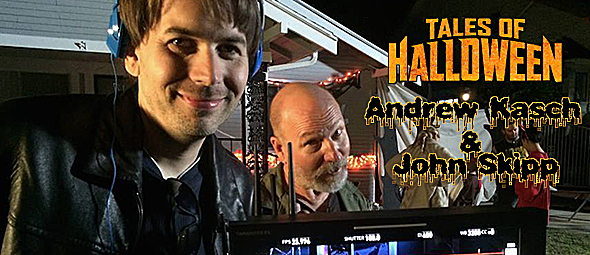


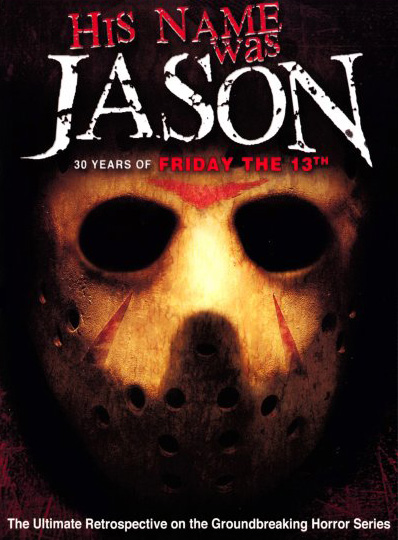
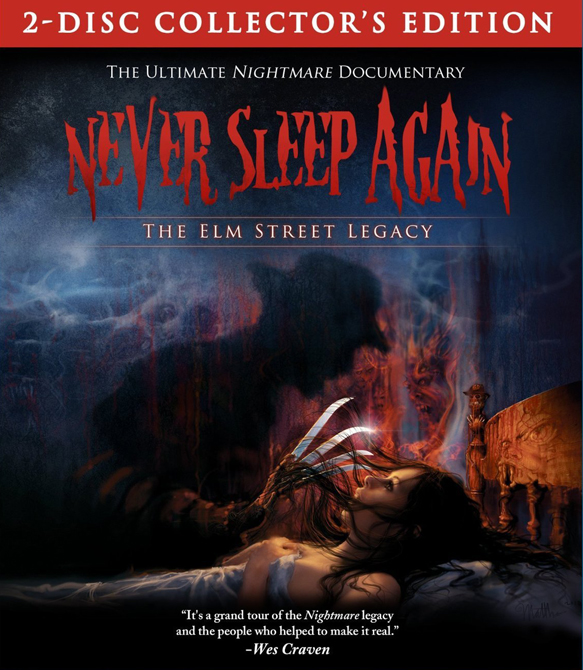
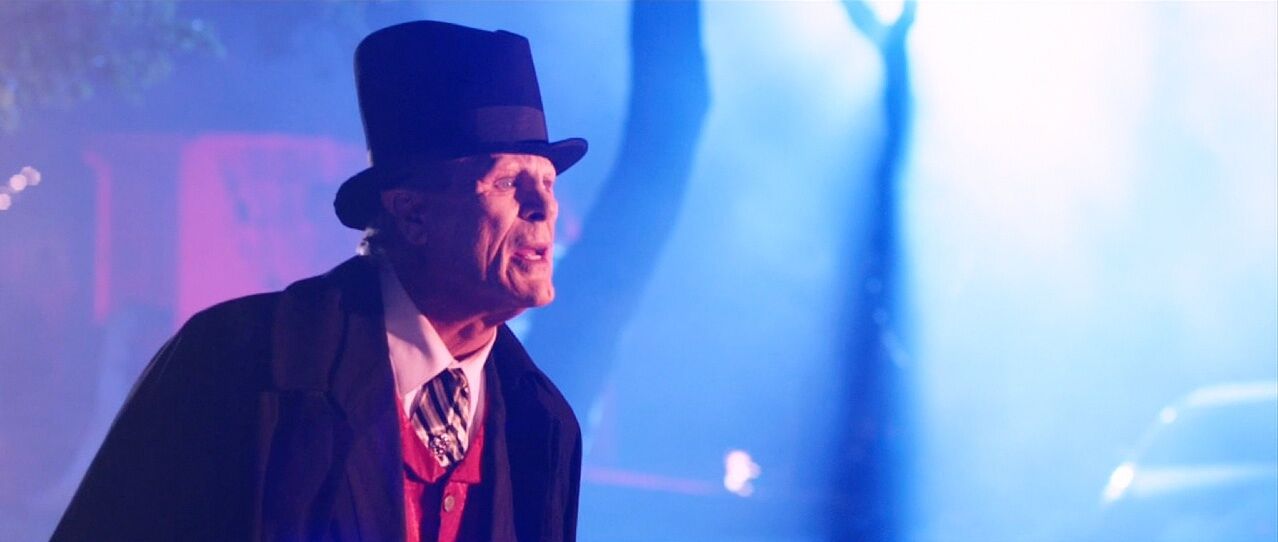
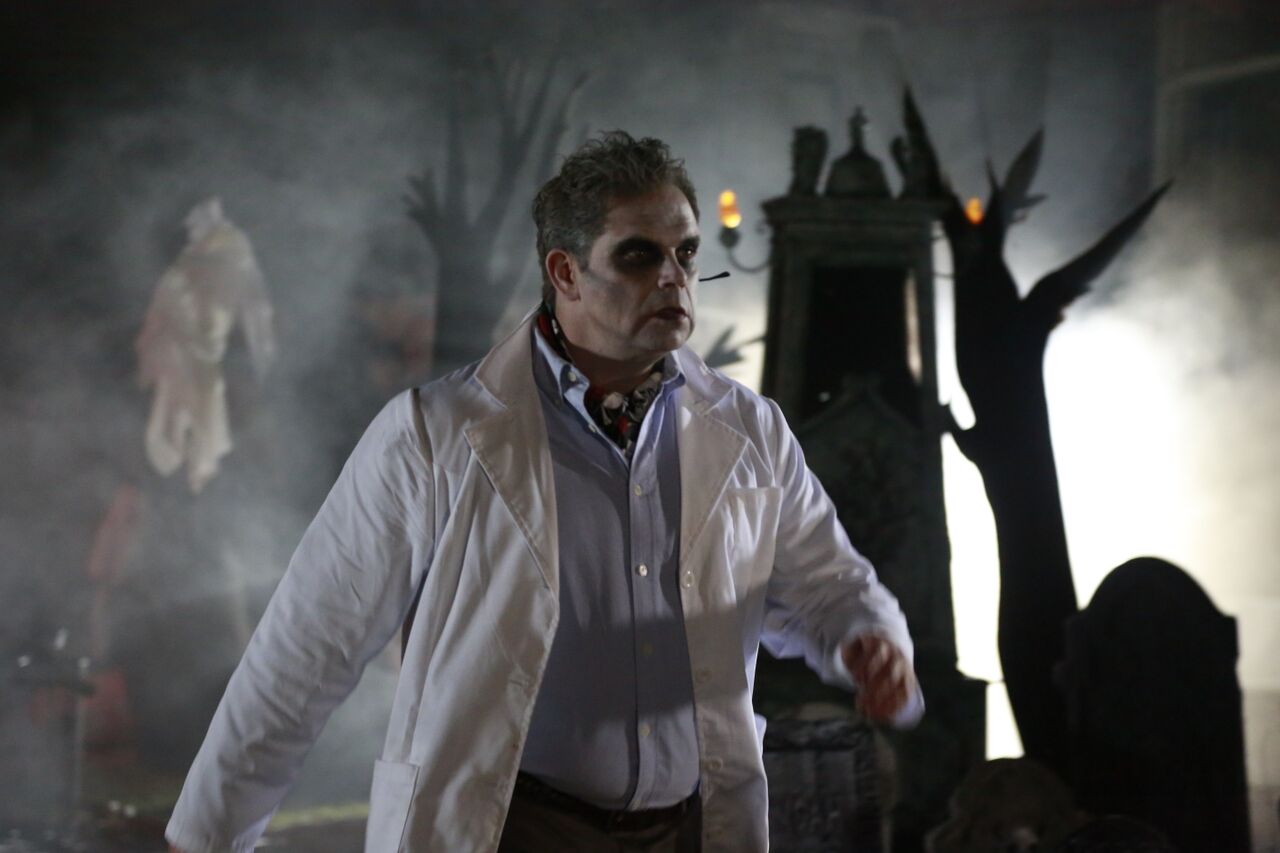

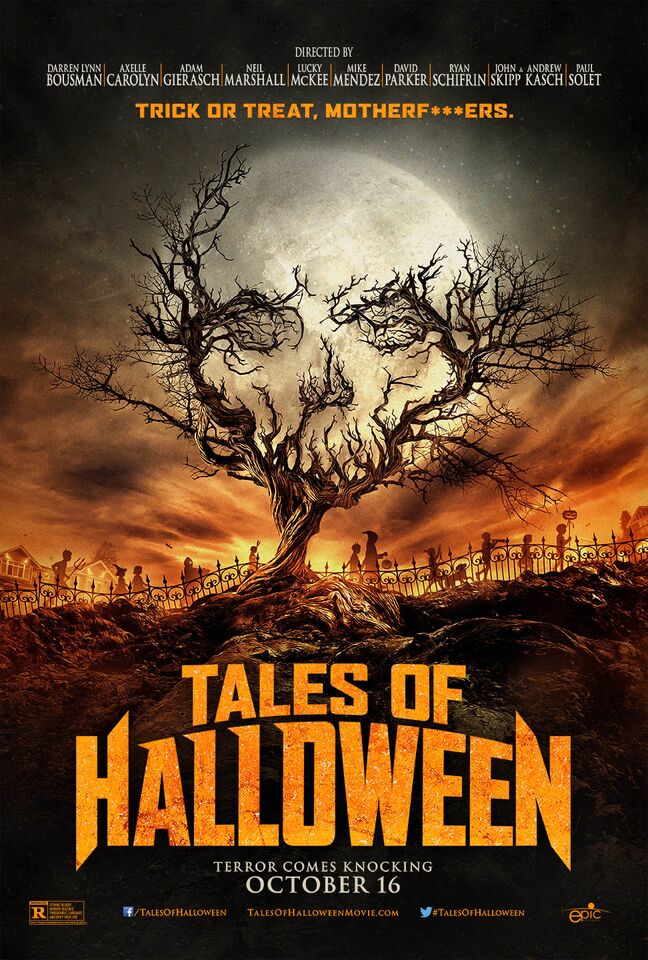







No comment